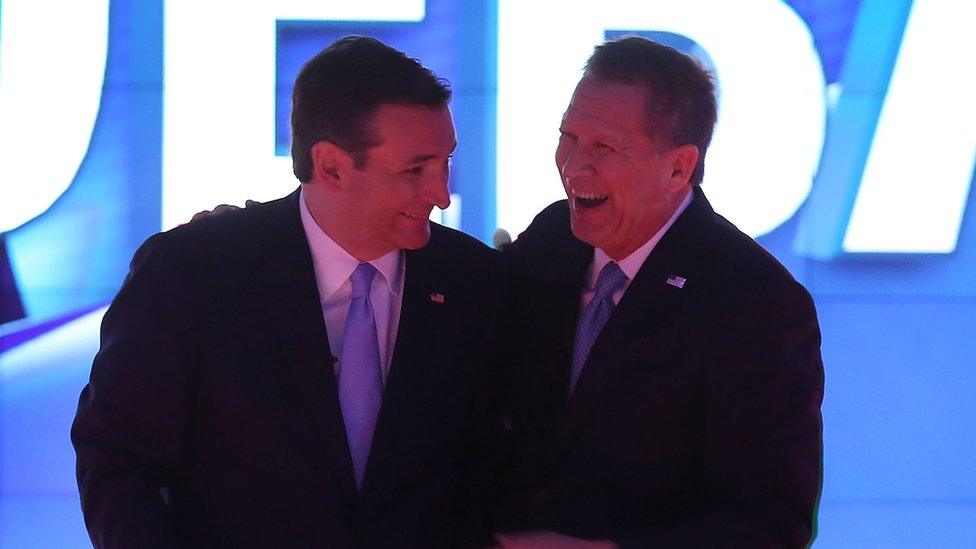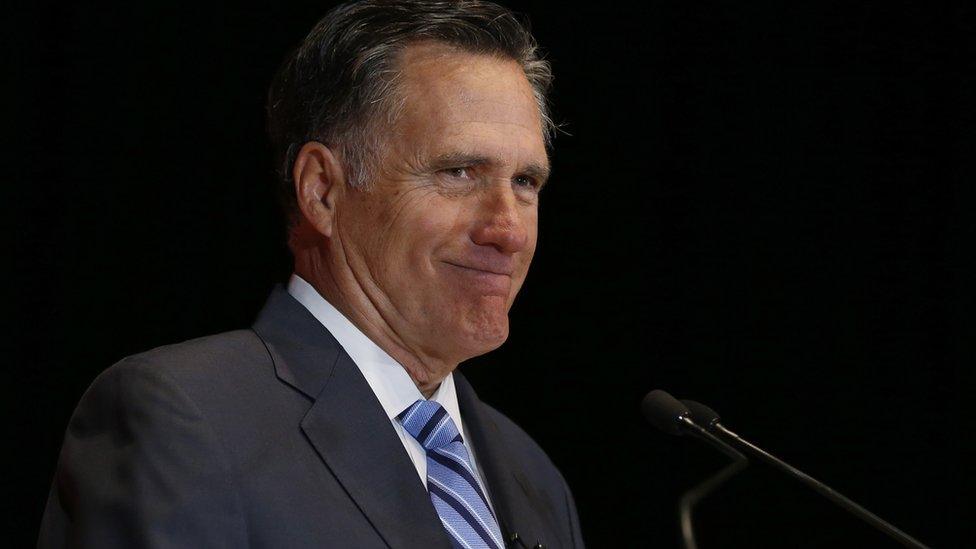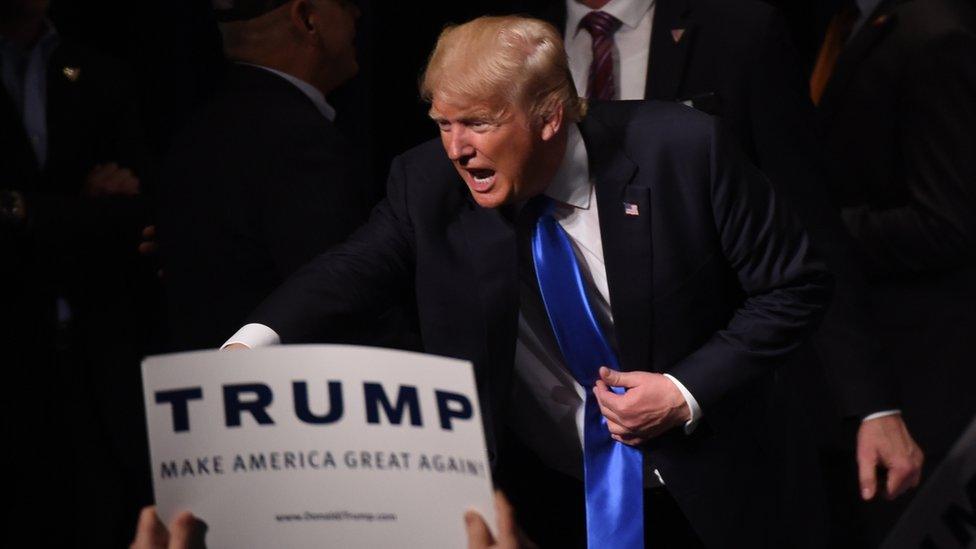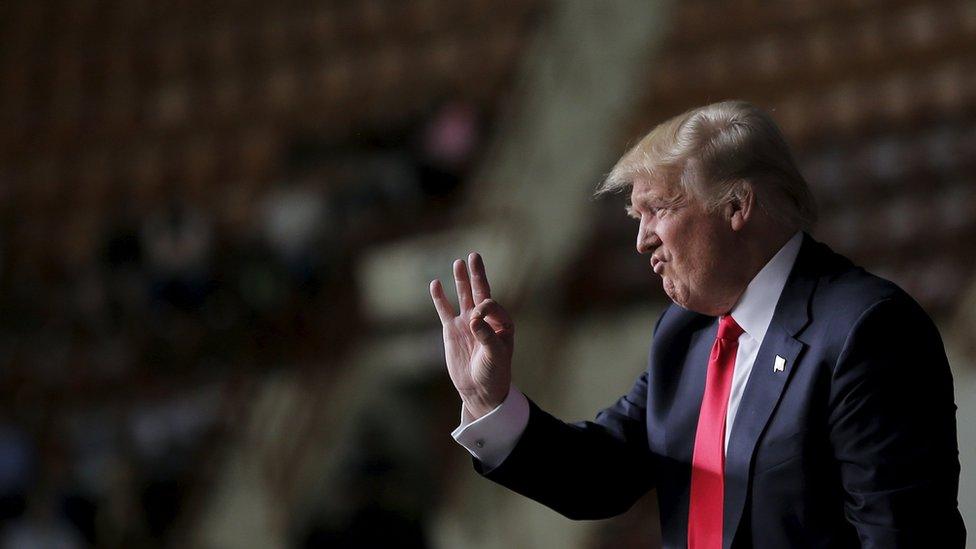Can the Cruz-Kasich tag-team beat Trump?
- Published

For the past few weeks Donald Trump has been railing against what he calls a "rigged" and "crooked" Republican nomination process and silent efforts to deny him the party's presidential bid.
As Republican National Committee head Reince Priebus has pointed out, external, the rules are the rules, and they aren't a secret.
But Mr Trump is right that there are forces coalescing to stop him. And as of Sunday night - with the announcement that presidential candidates John Kasich and Ted Cruz are co-ordinating their efforts in upcoming state primaries - those forces aren't so silent anymore.
Neither Mr Cruz nor Mr Kasich can win the 1,237 delegates necessary to secure the Republican nomination for themselves. Their only hope is to deny Donald Trump that opportunity as well. And now, at last, their campaigns are publicly acknowledging that they need each other's help to do so.
As the two campaigns explained in dual press releases, Mr Cruz will focus on Indiana on 3 May, while Mr Kasich will be given free rein to challenge Mr Trump head-on in the Oregon and New Mexico contests over the following weeks.
This announcement comes just days before Mr Cruz and Mr Kasich are likely to receive a thorough drubbing in a handful of states in the mid-Atlantic, including delegate-rich Pennsylvania.
By Wednesday morning Mr Trump could have put considerably more distance between himself and his two opponents. So this accord may be an early effort to push the focus past the next round of voting and on to more friendly contests.

2012 Republican nominee Mitt Romney has been calling for anti-Trump co-operation for nearly two months
Indiana, one of the last big prizes of the primary season, is shaping up to be a pivotal battleground. A recent poll, external shows Mr Trump with a comfortable lead in a three-way race that narrows considerably if Mr Kasich is taken out of the equation.
Given the rules in Indiana - 30 delegates to the candidate who wins a statewide plurality and three delegates to the top finisher in each of the state's nine congressional districts - every bit of help Mr Cruz can get to edge past Mr Trump will be invaluable.
Independent groups backing the #NeverTrump efforts are pouring resources into the state in the hopes that a massive advertising blitz will dent the New York mogul's image. It worked for them in Wisconsin two weeks ago, although those efforts also benefited from a state Republican Party unified in opposing Mr Trump and a conservative media that had been relentlessly bashing him for months.
The atmosphere in Indiana is much more muddled. Republican Governor Mike Pence is not endorsing any candidate, and the local talk radio hosts aren't as virulently anti-Trump.
This unite-to-defeat-Trump strategy has been kicked around for months, of course. When Wisconsin Governor Scott Walker ended his presidential bid last September, he urged his opponents to follow his lead and "clear the field" for a candidate with a "positive, conservative message" - ie not Mr Trump.
The Wisconsin Cassandra was universally ignored.
In early March, former Republican presidential nominee Mitt Romney called for exactly such an accord between non-Trump candidates, with each focusing on states where they could win and voters acting accordingly.
Shortly before his Florida primary flameout, Senator Marco Rubio's campaign announced it was ceding Ohio to Mr Kasich, perhaps hoping that the Ohio governor would return the favour in Mr Rubio's home state. Mr Kasich's team met the offer with mockery.

Donald Trump says the Cruz-Kasich accord is a sign of desperation
Times have changed. Now the Kasich campaign is more than willing to play the divide-and-conquer game. The problem, however, is that it would've been much more effective back in March, when Mr Trump was building his lead thanks to plurality wins over a fractured field. And one thing the two campaigns aren't doing is urging their supporters to actually vote for their counterpart.
The result is more a cessation of hostilities than a full-fledged joint effort. In addition, the agreement doesn't extend to the eight other primaries on the calendar in May and June.
Perhaps this is just a first step toward such full co-ordination. Or perhaps it's a bridge the two campaigns will never cross, dire straits or no.
If they don't co-ordinate in California on 6 June, however, it could be all for naught. Mr Trump has an imposing lead in the polls there, and big win will get him tantalisingly close to the numbers he needs for outright victory.
A majority of Republicans are telling pollsters that they think whoever wins the most votes and delegates, regardless of whether they get an outright majority, should be the nominee. If Mr Cruz and the anti-Trump movement want to avoid the perception that they're stealing the prize from the deserving winner, Indiana has to be just the beginning.
Mr Trump isn't going to be caught flat-footed, however. On Sunday night he took to Twitter, external to condemn the collusion - and has been on a tear ever since.
"DESPERATION!" he concluded.
And indeed it is. Only desperation would unite Mr Kasich and Mr Cruz, whose political views and temperament sit on opposite ends of the Republican Party. The remaining weeks of the campaign appear destined to become simply about the desperate measures necessary to stop Mr Trump before the convention.
Beyond that, now, there is nothing.
- Published22 April 2016

- Published20 April 2016
- Published15 April 2016